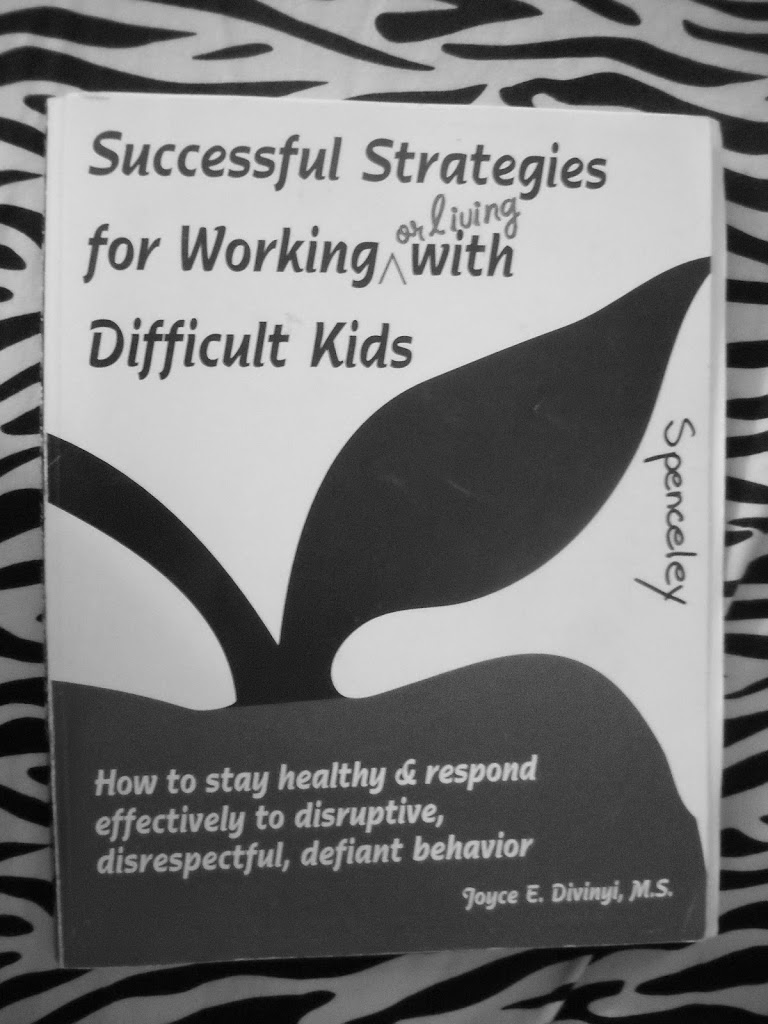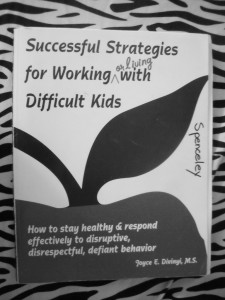In prep for my second counseling practicum (which starts Aug. 27 – prayers are appreciated!), in which I’ll work with children and adolescents, I borrowed a bunch of relevant books from my mom, who is a therapist.
One of them – Successful Strategies for Working or Living with Difficult Kids by Joyce E. Divinyi – is the 18th book I’ve read in full in 2012.
What I ultimately got out of the book is a better understanding of the importance of rising above your reflexes. When a difficult child is agitated, it might be instinctual to yell back, or return insult for insult, or criticize the kid for bad behavior. But those responses (and others like them) meet the needs of the adult (to be right, to be liked, to protect the ego, for instance). This is a problem because while the adult is meeting a need of his or her own, a child’s need goes unmet – the need for a role model, for example, or the need to be encouraged, even as he or she appears prepared to make a bad decision, to make a good choice (and that you believe he or she can do that).
The book is chock full of gems, as helpful for parents and future parents as for people whose professions require work with difficult kids (defined in the book as either defiant/disruptive or lethargic/unmotivated, whose emotional development might be arrested, all for a variety of reasons, including but not limited to having experienced a childhood trauma).
Here are some of my favorite excerpts:
On judging children:
“Just as our emotional reactions to these children lead to judgments, our judgments have a significant impact on our expectations for these children. And children respond to our expectations. If we believe they are trouble, and will continue to be trouble, often they are. … The first step, therefore … is to suspend your judgments. … Start with the idea that this child has the potential for success at some level, and that with creativity, perseverance and the right structure, you just may be the one to help him or her succeed.” -pages 22-23
On the problem with “passive activity”:
“Passive activity may sound like a contradiction in terms but it is a good way to describe television viewing. Many children are being overexposed to passive activity because they spend most of their free time in front of a television. It is not just the content of television programming that can have an impact on their lives. … (There are) some excellent programs available for children and adolescents–but there are many things children can never experience or learn by passively watching. … how to play, how to imagine, how to problem solve, how to communicate, how to handle their emotions, how to think, how to develop a skill, how to overcome mistakes, how to set goals, how to compete, how to work, how to interact with others, how to respond to authority, how to discern right from wrong.” -pages 30-31
On discerning the difference between appropriate and inappropriate behavior:
“If the behavior is unacceptable in the workplace, make it unacceptable in the classroom. … If a behavior would get someone fired in the workplace, it should not be tolerated in the classroom.” -page 49
On predicting a positive future:
“Be careful not to predict a negative future. Do not say, ‘If you keep this up, you are going to fail.’ Say instead, ‘You’re too smart to fail. If you decide to work hard at this, you will pass.'” -page 56
“It is especially helpful to affirm their ability to make a good choice when they are very agitated and most apt to do something wrong. You can say, ‘You’re a smart person. You can make a good choice now,’ in the place of saying, ‘You better not do that!’ or ‘If you do that, I’ll…'” -page 57
On giving kids choices instead of demands:
“(Say) … “These are choices, these are the consequences and these are the benefits or rewards,”. The system helps eliminate angry reactions and battles of the will by defining expectations in the form of choices the child makes rather than demands you make.” -page 65
On the importance of being consistent:
“Inconsistency in your responses to inappropriate behavior reinforces the very behavior you are trying to eliminate.” -page 73
On the importance of being firm, but respectful (i.e. don’t yell or talk down, don’t use “threatening words, tones or gestures”):
“These children need instruction in appropriate behavior and they need role models for positive behavior, conflict resolution and anger management. You are the model. You must show them how people work out differences or deal with angry feelings without being destructive to themselves or others. Many times you are their only opportunity to see these skills and traits in action.” -page 75
Yelling “communicates the message that you are not in control of yourself.” -page 84
On praising the deed instead of the person:
“Praise should always focus on behavior or actions, not on personality or personhood. Say, ‘You did great.’ Do not say, ‘You are a great guy.’ Say, ‘It was so good to hear you use words to express your anger instead of hitting or yelling.’ Do not say, ‘You are so good because you are learning to say your feelings.'” -page 88
On our mission with children:
“Sometimes parents, and even those of us who work with children, forget that our mission is to teach children to be independent of us.” -page 95
On why kids should experience reasonable, natural consequences:
“…When you take away opportunities to experience the consequences of mistakes, you rob children of their personal power, especially the power of resilience.” -page 97
– – – – –
Click here to read about all the books I read in 2012.


